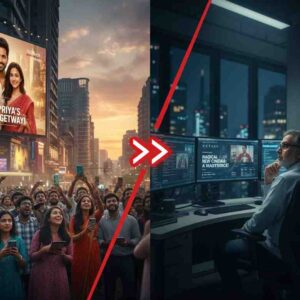Key Metrics (2025):
• Korea’s Content Exports (2023): $13.2 billion (all-time high) – Source: Korean Creative Content Agency (KOCCA)
• Netflix Korean Originals Investment: Over $2.5 billion committed (2023–2025) – Source: Netflix Korea
• Oscar-Winning Korean Films (since 2020):Parasite(Best Picture, 2020),Minari(Best Supporting Actress, 2021),Past Lives(Nominated, 2024)
• Top Streaming Titles Q1 2025:Gyeongseong Creature,Queen of Tears, andA Killer Paradoxtrending globally – Source: FlixPatrol
• Korean Actors in Hollywood Films: 15+ confirmed projects with Korean leads or co-leads in 2025 – Source: Variety, The Hollywood Reporter
The Global Rise of Korean Storytelling
What began as a regional wave withWinter SonataandBoys Over Flowershas evolved into a full-blown global tide. As of 2025, Korean creators—directors, screenwriters, and actors—are shaping the very narrative architecture of Hollywood and world cinema. From Netflix to Cannes, their storytelling grammar has become part of the global creative language.
According to KOCCA, South Korea’s cultural content exports hit $13.2 billion in 2023, marking an all-time high and outpacing exports from the country’s semiconductor sector in growth rate. This surge is largely driven by Korean films, TV series, and webtoons adapted for screen.
Streaming Power: Netflix and the Korean Pipeline
Netflix has been instrumental in turning K-content into a global phenomenon. After the seismic success ofSquid Gamein 2021, Netflix doubled down, committing over $2.5 billion from 2023 to 2025 for Korean originals. In 2025 alone, titles likeGyeongseong CreaturePart 2,Queen of Tears, andParasyte: The Greyhave topped global charts across Asia, Europe, and the Americas.
These shows combine fast-paced narratives, high emotional stakes, and visual elegance—offering something both familiar and distinctly Korean. Unlike many Western series, they often rely on just one season or a limited run, delivering narrative closure with cinematic weight.
Korean Filmmakers, Hollywood Scripts
Following the Oscar success of Bong Joon-ho and Lee Isaac Chung, Korean directors are now courted by Hollywood studios. Youn Sang-ho, known forTrain to Busan, is helming an American-Korean co-production for Universal Pictures. Meanwhile, Kim Jee-woon is directing a new dystopian thriller for A24.
Hollywood’s growing reliance on Korean talent is not limited to directing. Korean cinematographers, production designers, and writers are actively shaping the mood boards of major productions. The collaborative model is fast becoming an industry standard, especially in genre cinema—horror, sci-fi, and revenge thrillers.
Actors and Cross-Cultural Casting
Actors like Lee Jung-jae (Squid Game) and Han So-hee (My Name) are breaking out in Western projects. Jung-jae stars inThe Acolyte, part of Disney’s Star Wars franchise, while Han So-hee is rumored to lead an upcoming Amazon Studios thriller. The shift reflects a broader casting policy that embraces global appeal while remaining culturally authentic.
In reverse, Korean adaptations of Western IPs are also booming—Money Heist: KoreaandCriminal Minds Koreabeing prominent examples, proving the adaptability of storytelling formats across borders.
Conclusion: Beyond the Korean Wave
The term “K-Wave” no longer captures the extent of South Korea’s global cinematic influence. In 2025, Korea is not just exporting stories—it is co-authoring the global screenplay. Korean creators are not guests in Hollywood; they’re now architects of a new, cross-cultural cinematic future.
As streaming platforms globalize viewership and studios prioritize diverse voices, Korean storytelling stands at the heart of this transformation—refined, resonant, and ready to redefine what the world watches next.










